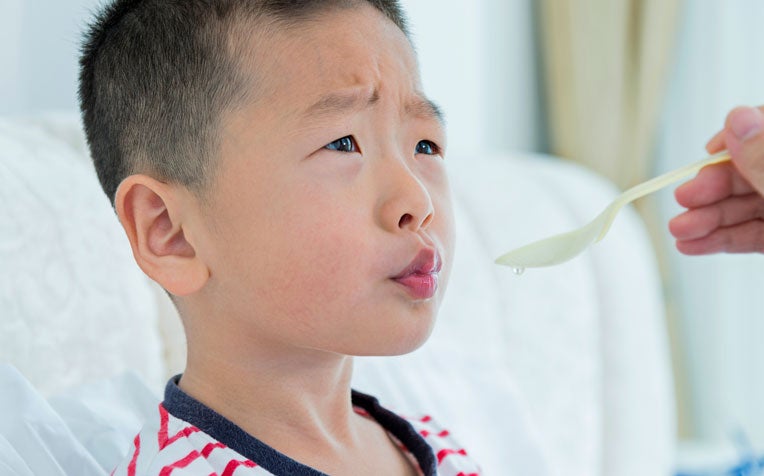
Children medicine Do you really know what you’re using to medicate your kids?
Almost half the parents surveyed by Australian Researchers said they might have given their children the wrong dose of common over the-counter drugs, putting their children’s health, and even lives, at risk. While parents here are more careful when giving such medicines to their children, a paracetamol overdose is still among the top three most common drug-related emergencies seen at KK Women’s and Children’s Hospital (KKH) Accident and Emergency (A&E) department.

Common drugs given in wrong doses to children
Apart from paracetamol, other drugs commonly given in the wrong doses include ibuprofen to bring down a fever, as well as cough and runny nose medication, said Associate Professor Ng Kee Chong, Senior Consultant and Head, Children's Emergency Service, KKH, a member of the SingHealth group. “Over-the-counter medications will have been approved by regulatory authorities such as Health Sciences Authority, and are by nature relatively safe, if taken as instructed,” said Assoc Prof Ng, who is also co-chair and member of the Ministry of Health’s Clinical Practice Guidelines on Toxicology.
Be wary when administering medication to children
But confusing instructions are still among the leading causes of medication error, according to overseas studies. Others include lack of dispensers and varying units of measurement. “Also, children grow and what was effective for a younger child may not be enough when he is older and heavier,” said Assoc Prof Ng.
One way for parents to prevent children from taking an overdose of medication is to have only one person responsible for administering medication. “Otherwise, too many cooks may spoil the broth,” said Assoc Prof Ng. Giving different medicines at the same time might lead to an accidental overdose and parents should check the active ingredients to make sure they aren’t the same before doing so. More is not necessarily better either.
“Oral medications usually take about 30 minutes to an hour to work. Giving more will not result in the medication working faster,” he said. Potential side effects vary according to the dosage given and the type of medication. For example, while the effects of taking an overdose of runny nose or cough mixture may be felt in four to six hours, liver failure caused by paracetamol poisoning will not occur until two to three days later, said Assoc Prof Ng.
In the event of an overdose
If an overdose of medicine is taken accidentally, children should be rushed to the hospital where doctors will first make sure the child’s vital signs, breathing and circulation are stable, and his airway is clear. They will then try to minimise the absorption of the medication into the body by pumping the stomach, inducing the child to vomit or giving oral activated charcoal. If the medicine is absorbed into the bloodstream, an antidote will be given. When in doubt, parents should consult the pharmacist before buying medication for their children, said Assoc Prof Ng.
Keep medications out of children's reach
There are specific medications, mainly prescription-only drugs that are poisonous for young children. “We’ve seen very young infants at A&E who had intermittent breathing (known as apnoea) after being given ‘flu’ medications like chlorpheniramine (a type of antihistamine),” said Assoc Prof Ng.
Know your dosage units
In Singapore, parents have to be aware that when doctors talk about dosages for children, they usually refer to the number of milligrammes the child needs – not millilitres – as concentrations of drugs vary between brands and the former provides a more accurate dosage, said Assoc Prof Ng. These dosages are normally calculated based on the milligrammes of medication required per kilogramme of the child’s weight.
Ref: T12
Contributed by


















 Get it on Google Play
Get it on Google Play